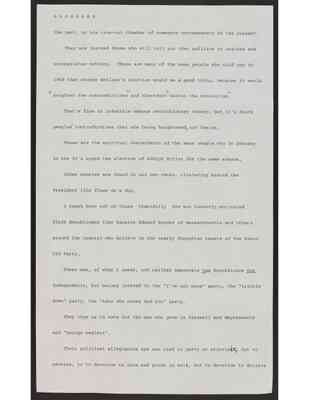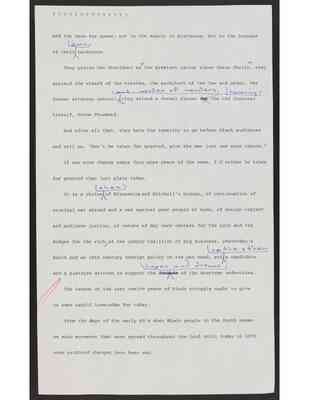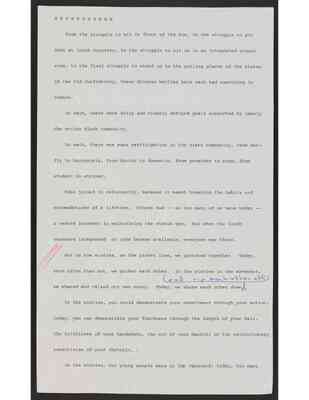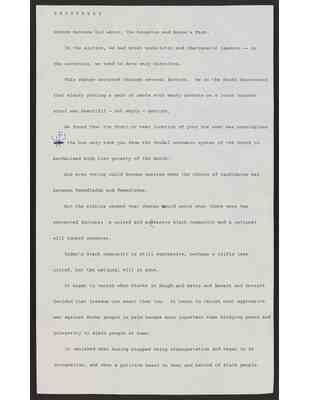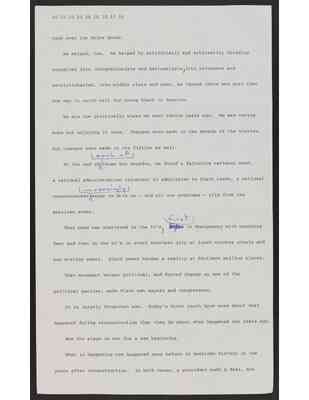Pages
6
6 6 6 6 6 6 6 6
the past, or his crew-cut chamber of commerce contemporary of the present.
They are instead those who will tell you that politics is useless and accomplishes nothing. These are many of the same people who told you in 1968 that George Wallace's election would be a good thing, because it would "heighten the contradictions" and therefore "hasten the revolution."
That's fine in infantile campus revolutionary theory, but it's Black peoples' contradictions that are being heightened, not theirs.
These are the spiritual descendants of the same people who in Germany in the 30's urged the election of Adolph Hitler for the same reason.
Other enemies are found in our own ranks, clustering around the President like fleas on a dog.
I speak here not of those thankfully few but honestly motivated Black Republicans like Senator Edward Brooke of Massachusetts and others around the country who believe in the nearly fogotten tenets of the Grand Old Party.
These men, of whom I speak, are neither Democrats nor Republicans nor Independents, but belong instead to the "I've got mine" party, the "trickle down" party, the "take the money and run" party.
They urge us to vote for the man who gave us Carswell and Haynesworth and "benign neglect".
Their political allegiances are not tied to party or principalle, but to pennies, to to devotion to race and pride in self, but to devotion to dollars
7
7 7 7 7 7 7 7 7 7 7 7 7 7 7
and the race for power; not to the Beauty in Blackness, but to the bigness of their own bankbooks.
They praise the President as "the greatest savior since Jesus Christ", they applaud the wizard of the wiretap, the architect of the law and order, the former attorney general, and wonder of wonders, they attend a formal dinner for honoring the old Dixicrat himself, Strom Thurmond.
And after all that, they have the temerity to go before Black audiences and tell us, "Don't be taken for granted, give the man just one more chance."
If one more chance means four more years of the same, I'd rather be taken for granted than just plain taken.
It is a choice then of Nixonomics and Mitchell's mixups, of continuation of criminal war abroad and a war against poor people at home, of benign neglect and mediocre justice, of vetoes of day care centers for the poor and tax dodges for the rich, of the unholy coalition of big business, yesterday's South and an 18th century foreign policy on the one hand, and on the other a candidate and a platform written to support the demands hopes and dreams of the American underclass.
The lesson of the last twelve years of Black stuggle ought to give us some useful knowledge for today.
From the days of the early 60's when Black people in the South began an epic movement that soon spread throughout the land until today in 1972 some profound changes have been won.
8
8 8 8 8 8 8 8 8 8 8 8
From the struggle to sit in front of the bus, to the struggle to sit down at lunch counters, to the struggle to sit in in an integrated school room, to the final struggle to stand up in the polling places of the States of the Old Confederacy, these diverse battles have each had something in common.
In each, there were fully and clearly defined goals supported by nearly the entire Black community.
In each, there was mass participation in the Black community, from bar- fly to bourgeosie, from doctor to domestic, from preacher to pimp, from student to striver.
Some joined in reluctantly, because it meant breaking the habits and accomodations of a lifetime. Others had -- as too many of us have today -- a vested interest in maintaining the status quo. But when the lunch counters integrated or jobs became available, everyone was there.
But in the sixites, on the picket line, we picketed together. Today, more often than not, we picket each other. In the sixties in the movement, we shared and raised our own money. Today , we shake each other down and rip each other off.
In the sixties, you could demonstrate your commitment through your action; today, you can demonstrate your Blackness through the length of your hair, the trickiness of your handshake, the cut of your dashiki or the revolutionary romanticism of your rhetoric.
In the sixties, our young people were in the vanguard; today, too many
9
9 9 9 9 9 9 9 9 9
bounce between bid whist, the bougaloo and Boone's Farm.
In the sixties, we had great moralistic and charismatic leaders -- in the seventies, we tend to have only ourselves.
This change occured through several factors. We in the South discovered that simply putting a pair of pants with empty pockets on a lunch counter stool was beautiful - but empty - gesture.
We found that the front or rear location of your bus seat was meaningless when if the bus only took you from the feudel ecocomic system of the South to mechanized high rise poverty of the North.
And even voting could become useless when the choice of candidates was between Tweedledum and Tweedledee.
But the sixties showed that change wcould occur when there were two connected factors; a united and aggressive Black community and a national will toward progress.
Today's Black community is still aggressive, perhaps a trifle less united, but the national will is gone.
It began to vanish when Blacks in Hough and Watts and Newark and Detroit decided that freedom now meant them too. It began to vanish when aggressive war against Brown people in Asia became more important than bringing peace and prosperity to Black people at home.
It vanished when busing stopped being transportation and began to be integration, and when a politics based on fear and hatred of Black people
10
10 10 10 10 10 10 10 10 10
took over the White House.
We helped, too. We helped by artificially and arbitrarily dividing ourselves into integrationists and nationalists, into reformers and revolutionaries, into middle class and poor, as though there was more than one way to catch hell for being Black in America.
We are now politically where we were twelve years ago. We are voting more but enjoying it less. Changes were made in the decade of the sixties, but changes were made in the fifties as well.
At the end of each of those two decades, we found a faltering national mood, a national administration reluctant to administer to Black needs, a national consciousness increasingly eager to have us - and all our problems - slip from the American scene.
That mood was shattered in the 50's. First , firstin Montgomery with marching feet and then in the 60's in every southern city at lunch counter stools and bus station seats. Black power became a reality at Southern polling places.
That movement became political, and forced change on one of the political parties, made Black men mayors and congressmen.
It is largely forgotten now. Today's Black youth know more about what happened during reconstruction than they do about what happened ten years ago.
Now the stage is set for a new beginning.
What is happening now happened once before in American history in the years after reconstruction. In both cases, a president made a deal, not
